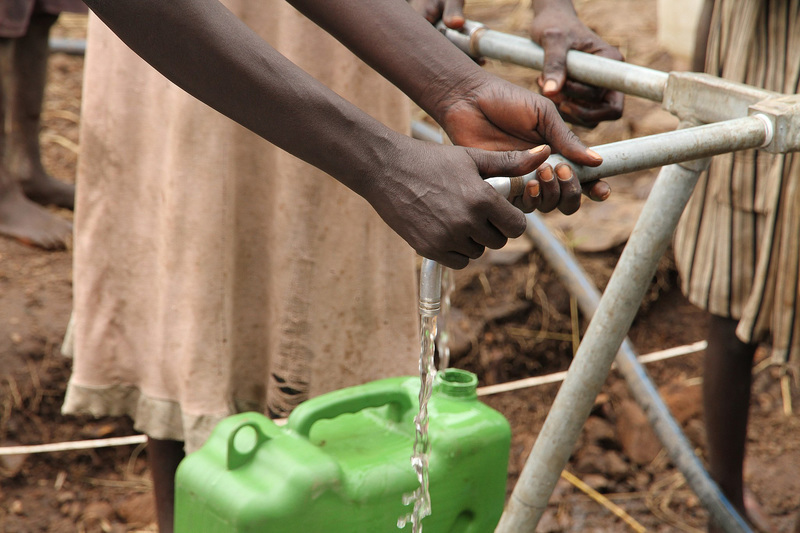Water security: Local buy-in is critical
18 June 2018 | Story Gina Ziervogel and Salma Hegga. Photo Oxfam/Aimee Brown. Read time 6 min.
Most emerging democracies in Africa have implemented decentralisation in some form since the 1990s. In the water sector, decentralisation aims to share responsibility for managing water resources and services. It shifts responsibility from national government to include lower-level governmental and community organisations.
Participation is a crucial element of decentralisation. Its aim is to ensure that a range of people, across sectors and scales, are involved in making decisions around how to use and manage resources.
There is something to learn from those who have tried and tested how to encourage participation in the water sector over the past 20 to 30 years. Although there are challenges with decentralisation there are also successes as examples from Ghana, Kenya and India show.
Our ongoing research looks at three rural villages in Namibia’s Onesi constituency, bordering Angola. This research suggests that decentralised water governance might not have the impact that was intended. This is because decentralisation efforts have not paid enough attention to strengthening the voice of local people and their ability to participate in decision making.
The challenges of managing water in rural areas
Since 1997, Namibia has followed a community based water management strategy. This means that rural communities need to manage and pay for water services. Locally elected committees consist of volunteers who are responsible for opening taps at standpipes and collecting user fees.
Most of the volunteers can’t read. They also live in poverty. They find it difficult to balance their water point responsibilities with doing what they need to survive, like farming. This has created a situation where many community water points are closed and poor people cannot afford to get water from private taps. When taps shut down villagers often rely on hand-dug wells to draw free water during the dry season. This often has negative health implications because the water quality is poor.
Villagers often complained that planning decisions didn’t consider their needs. The lines of communication were not clear to them and they didn’t have a space to discuss issues or grievances. So decentralisation that involved local people in some ways actually ended up isolating the most vulnerable in other ways.
Decentralisation is a complex process. This example from Namibia shows its failings when local people’s capacity is not sufficiently considered. Without the institutional knowledge, distributed finances and technical support from government, it is hard for villagers to manage water successfully.
Lessons from other areas
Drawing on similar projects from our research group in other regions, a few lessons can be learnt. In India and Ghana, women’s representation is promoted by having seats for women from marginalised groups on local bodies. The aim is to include more diverse voices in water governance. Although this is a good step, entrenched patriarchy can mean that female representation on village committees is simple tokenism.
New approaches to governance are needed to support effective participation of different groups that might contribute to more sustainable use of water resources. There is a growing presence of non-state actors that are helping to mobilise and facilitate participation at the local level. Some examples include NGOs in Kenya, Ghana and Namibia.
These organisations can provide support and expertise where local and national governments can’t. In Ghana, irrigation farmer associations and landlords located near the Black Volta River have been collaborating with the Water Resources Commission to ensure safe farming practices.
One of the opportunities that decentralisation has provided in Kenya has been the integration of customary resource institutions into formal water management. These institutions manage water and pasture, and their integration has resulted in more equitable and inclusive outcomes for the communities they work with.
It has also resulted in partnerships between communities and the private sector as well as proper regulation and reduced water theft. Such partnerships have also helped to reduce water conflicts between upstream and downstream users and between pastoralists and agro-pastoralists.
Implications for climate change adaptation
Decentralisation has also been billed as a critical factor to help communities face the challenges of climate change. In many cases, attempts to help communities adapt to climate changes rely on technical solutions. But the experience from decentralisation in the water sector has shown just how important it is to embed technical solutions in effective governance.
Experience from decentralisation suggests that coordination and development of roles and responsibilities between different stakeholders and government levels is hard to put into practice. The biggest challenge results from undemocratic practices.
If local communities are the ones that need to benefit most from adaptation, it is critical that their voice is heard. But to achieve this, it is crucial to make them capable. To realise this there needs to be partnerships between national and local government, academia, NGOs and the private sector.
Participation does not just happen once there is a shift in responsibility. Participation for both decentralisation and climate adaptation needs to be developed intentionally and collaboratively.
This will be a focus at the upcoming Adaptation Futures 2018 conference in water-scarce Cape Town. Academics and practitioners from around the world will gather to explore questions about climate change adaptation.
![]() Brendon Bosworth and Irene Kunamwene made key contributions to this article.
Brendon Bosworth and Irene Kunamwene made key contributions to this article.
Gina Ziervogel, Associate Professor, Department of Environmental and Geographical Science and African Climate and Development Initiative Research Chair and Salma Hegga, Research Consultant - Adaptation at Scale in Semi-Arid Regions Project (ASSAR).
 This work is licensed under a Creative Commons Attribution-NoDerivatives 4.0 International License.
This work is licensed under a Creative Commons Attribution-NoDerivatives 4.0 International License.
Please view the republishing articles page for more information.










